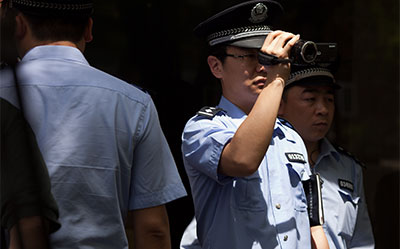China’s state news agency Xinhua published the full text of the state council’s National Human Rights Action Plan 2012-15 on Monday. There is no section dedicated to press freedom. But the most striking omissions can be found in the text itself.
Section 7 of the Civil and Political Rights segment of the plan promises to “strengthen institutional guarantees for the legitimate rights and interests of news agencies and journalists.” The section is titled “Right to be heard” not “Freedom of expression.”
Do rights, in this context, actually mean freedom? Up to a point. In 2010 CPJ published a special report on the hot topic of “press rights” in China. In that report, academic and media analyst Zhan Jiang explained that Chinese journalists avoid terms like “press freedom,” with its connotations of Western-style democracy. “What do we say instead? Media rights. It means the same.”
So far, so good. But what Zhan described is the way domestic journalists adopt sanctioned rhetoric to advocate for themselves and their colleagues without reprisal from the authorities. That’s a creative and a laudable endeavor, but it’s not the same as freedom. And the rhetoric has significant limits, as we found in the 2010 report:
“The Chinese government has long claimed to respect people’s rights–not human rights but citizens’ rights, which are rights that the state grants in its constitution and defines in its laws, rather than those that have their own existence and can’t be infringed,” Andrew Nathan, a China specialist and political science professor at Columbia University, told CPJ. “In the eyes of the regime, there is no contradiction between asserting those rights and maintaining that it’s the duty of journalists to serve the party, to obey the instructions of the Party Propaganda Department. All in all, the concept of ‘rights’ the Chinese government is using is one that perfectly well allows them to have an action plan to improve the protection of these rights, without intending in any way to weaken the Party’s monopolistic grip on power.”
Like its predecessor the 2009-10 plan, today’s document will, if properly implemented, have a positive impact for citizens most in need of protection. But it also serves as a blueprint for continuing restrictions, and the media sections are a case in point. The language allows journalists their rights, but the legitimacy of those rights is determined “in accordance with the law.” As CPJ research has shown time and time again, media “laws” in China, for international as well as domestic journalists, rarely hold water in the courts. At best, they are regulations which are patchily implemented. At worst they are fictional, evoked as cover for arbitrary security or propaganda decisions made by Communist Party authorities.
Back in 2009, we took the view that any engagement with human rights from China was positive, but it’s more difficult to hold that position today. For a start, that’s the line the propaganda department is using: “An action plan for human rights protection can be regarded as a sign that the state attaches great importance to human rights issues,” in Xinhua’s words. The plan also allows Xinhua to state that “China has made considerable progress in human rights protection” while remaining silent on data which contradicts that claim, like the 27 journalists CPJ documented behind bars in China in 2011. “Legitimate rights” for journalists are better than no rights at all, unless their purpose is to perpetuate media control. Journalists in China will make the most of any leeway this action plan provides them, but they will not mistake its guarantees for press freedom. We shouldn’t either.
